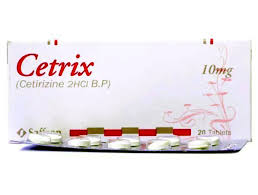Amygra (60mg) 20 Tablets
₨ 194
-
Description
Pyridostigmine works by inhibiting the enzyme acetylcholinesterase. This enzyme is responsible for breaking down acetylcholine, a neurotransmitter, in the synaptic cleft (the space between nerve cells and muscle cells). By blocking acetylcholinesterase, pyridostigmine prevents the breakdown of acetylcholine. This leads to increased levels of acetylcholine in the synaptic cleft. The increased concentration of acetylcholine enhances neuromuscular transmission by allowing acetylcholine to bind more effectively to its receptors on the muscle cells. This results in improved muscle contraction and reduced muscle weakness. By enhancing the effectiveness of acetylcholine at the neuromuscular junction, pyridostigmine helps improve muscle strength and endurance in conditions where acetylcholine transmission is impaired.
Description
-
Description
Pyridostigmine works by inhibiting the enzyme acetylcholinesterase. This enzyme is responsible for breaking down acetylcholine, a neurotransmitter, in the synaptic cleft (the space between nerve cells and muscle cells). By blocking acetylcholinesterase, pyridostigmine prevents the breakdown of acetylcholine. This leads to increased levels of acetylcholine in the synaptic cleft. The increased concentration of acetylcholine enhances neuromuscular transmission by allowing acetylcholine to bind more effectively to its receptors on the muscle cells. This results in improved muscle contraction and reduced muscle weakness. By enhancing the effectiveness of acetylcholine at the neuromuscular junction, pyridostigmine helps improve muscle strength and endurance in conditions where acetylcholine transmission is impaired.
-
Ingredients
Pyridostigmine -
Dosage Form
Tablet
-
Uses
Pyridostigmine is used to improve muscle strength in patients with a certain muscle disease (myasthenia gravis). It works by preventing the breakdown of a certain natural substance (acetylcholine) in your body. Acetylcholine is needed for normal muscle function.
-
Dosage
Pyridostigmine dosage recommendations are:
- Paralytic ileus, Postoperative urinary retention – Adult – As conventional tab – 60 to 240 mg daily. Dosing frequency may vary according to patient’s needs.
- Paralytic ileus, Postoperative urinary retention – Child – As conventional tab – 15 to 60 mg daily. Dosing frequency may vary according to patient’s needs.
- Myasthenia gravis – Adult – As conventional tab or oral solution – Usual total daily dose – 300-1,200 mg. As extended-release tab – 180 to 540 mg once daily or bid.
- Myasthenia gravis – Child – As conventional tab or oral solution – <6 years Initially, 30 mg. 6-12 years Initially, 60 mg. Usual total daily dose – 30 to 360 mg.
-
In case of Overdose
Contact your doctor straight away. Signs of overdose are muscle or abdominal (tummy) cramps, diarrhoea, feeling sick, vomiting, increased saliva (mouth liquid), pin-point pupils of the eyes, sweating, muscle twitching, weakness, and slow heart-rate. If you have any further questions on the use of this medicine, ask your doctor or pharmacist.
-
Missed Dose
If you miss a dose, take it as soon as you remember. If it is close to the next dose, skip the missed dose. Do not take double doses.
-
How To Use
Always take this medicine exactly as your doctor or pharmacist has told you. Check with your doctor or pharmacist if you are not sure. The dose of Mestinon depends on the condition for which it is being used.
-
When Not to Use
Do not take Pyridostigmine if you:
- Have a twisted or obstructed digestive tract
- Cannot pass urine due to an obstruction
- Are allergic to pyridostigmine, bromine, or any of the other ingredients
-
Side Effects
Unraveling the side effects lurking behind this product are the following:
• Upset stomach
• Diarrhea
• Vomiting
• Drooling
• Pale skin
• Cold sweats
• Blurred vision
• Watery eyes
-
Precautions & Warnings
(pyridostigmine) is contraindicated in mechanical intestinal or urinary obstruction, and particular caution should be used in its administration to patients with bronchial asthma. Care should be observed in the use of atropine for counteracting side effects
-
Drug Interactions
Drug interactions with pyridostigmine include:
- Anticholinergics (e.g., atropine) (may reduce the effectiveness of pyridostigmine)
- Neuromuscular blockers (e.g., vecuronium, succinylcholine) (pyridostigmine may potentiate the effects of neuromuscular blockers)
- Corticosteroids (e.g., prednisolone) (may reduce the effectiveness of pyridostigmine)
- Beta-blockers (e.g., propranolol) (may enhance the effects of pyridostigmine)
- Nonsteroidal anti-inflammatory drugs (NSAIDs) (e.g., ibuprofen) (generally minimal interaction, but monitor for gastrointestinal side effects)
- Antidepressants (e.g., tricyclics) (may interfere with the effects of pyridostigmine)
-
Storage/Disposal
Store at room temperature in a tightly closed container. Dispose of unused or expired medication by returning it to a pharmacy for safe disposal.






Reviews
There are no reviews yet.